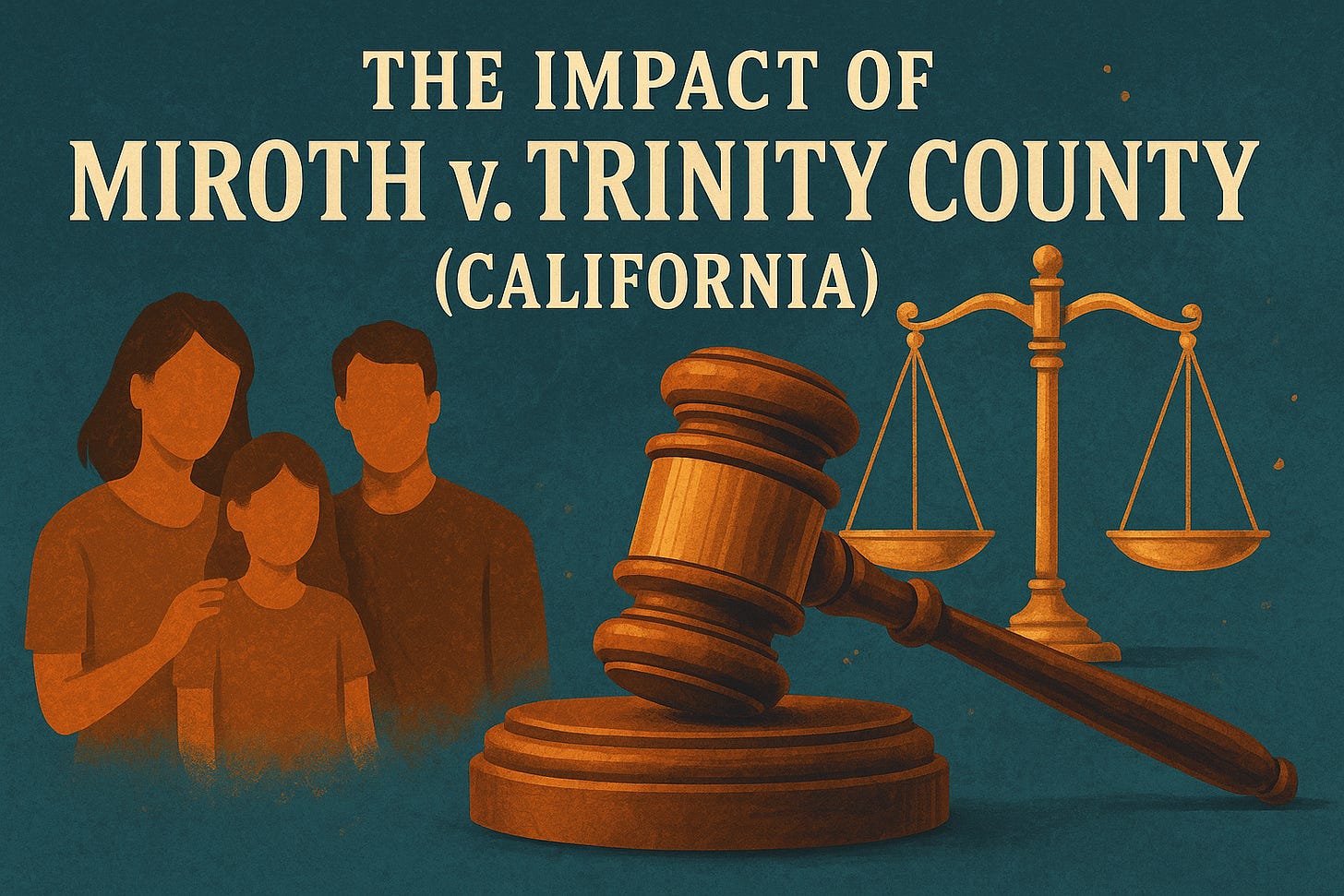In a powerful rebuke of bureaucratic overreach, on May 8, 2025, the United States District Court in California delivered a resounding victory for Trish Miroth in her civil rights case against Trinity County Child Protective Services. This ruling does more than vindicate one mother’s fight for justice—it shakes the legal foundations counties often use to shield themselves from accountability.
The Case: A Mother vs. the Machine
Trish Miroth brought a federal lawsuit after Trinity County CPS removed her children without lawful cause or due process. Rather than address the heart of her constitutional claims, the County sought to have the case dismissed using a controversial procedural doctrine: Rooker-Feldman.
The Rooker-Feldman doctrine is frequently invoked by government defendants to argue that federal courts lack jurisdiction to review state court decisions. In theory, it’s meant to prevent federal courts from acting as appellate bodies for state judgments. In practice, it’s often misused—especially in child welfare cases—to deny families their right to sue over civil rights violations that occurred outside the courtroom.
But this time, the tactic failed.
The Court’s Ruling: Due Process Still Matters
The judge rejected Trinity County’s argument, ruling that Rooker-Feldman did not apply. Why? Because Miroth wasn’t appealing a state court judgment—she was challenging the County’s actions that violated her federally protected rights. The distinction was crucial.
By affirming that federal courts can—and should—hear civil rights cases involving wrongful CPS action, the court dismantled the County’s only line of defense. Miroth’s lawsuit can now move forward, and her claims will be evaluated on their merits.
Why This Decision Is a Game Changer
The significance of Miroth v. Trinity County cannot be overstated:
It sets a precedent for parents across the country who have been denied access to justice due to misapplied legal doctrines.
It clarifies that federal courts have a duty to hear constitutional claims involving CPS, even when those claims intersect with state family court matters.
It chips away at the legal fortress CPS agencies often hide behind, empowering parents to fight back against unjust removals.
This decision opens a critical door for families who were previously shut out of federal court by flawed interpretations of jurisdiction.
A Warning to CPS Agencies—and a Beacon to Families
For too long, child protective agencies have operated in the shadows of immunity and obscure doctrines. They’ve torn families apart with little oversight, confident that federal judges would dismiss challenges before they ever reached trial.
Miroth flips that narrative.
It tells counties: due process isn’t optional. And it tells families: the federal courthouse is open when your rights have been trampled.
Final Thoughts: The Courage Behind the Case
Trish Miroth’s fight is far from over. But her courage has already changed the landscape. She challenged not just a county agency, but a system that routinely silences parents through red tape and legal gymnastics. And she won.
For every family still entangled in the fog of CPS overreach, Miroth v. Trinity County is a signal flare in the night: there is hope, there is recourse, and justice is possible—even when the state tells you it’s not.
Reference: https://www.stolenchildrenbycps.com/about-1-4
Support This Message
If you believe in restoring constitutional protections to families, children, and citizens, share this article. Speak up. Help others resist coercive, non-judicial removals that strip away our most fundamental rights.
Want to support my journalism?
Donate here so I can keep writing and defending truth, justice, and due process for all.







Would love to find out how to sue them without the lawyers that enable CPS and profit from them too...
Child PROCUREMENT Service.
They LITERALLY steal children for money.
Yes really-